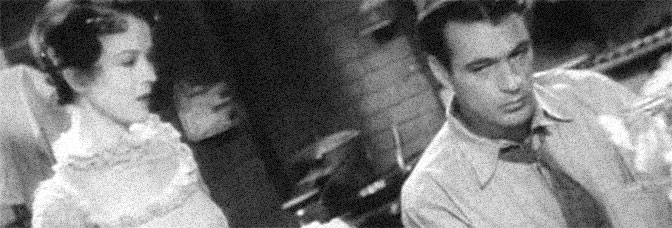One Sunday Afternoon suffers from some of the standard play-to-film problems. The scenes go on too long, especially in the first half, which only contains three real scenes. The opening, which is a lengthy, seemingly direct adaptation from the play, features Gary Cooper and Roscoe Karns talking to each other as way of establishing the characters and setting. It’s problematic to say the least, since their dialogue isn’t particularly interesting and because it just drags the film down, right from the start.
What’s strange about the opening is the make-up. One Sunday Afternoon is told mostly in flashback, with the opening and end in the modern day. The film establishes Cooper and Karns in old age make-up at the start. It’s a conventional narrative move and what’s strange about it has nothing to do with it as a storytelling device. The strange thing is the fantastic make-up work. I can’t find any credits for it, but whoever came up with it did an amazing job. It’s more of a shock seeing Cooper without the make-up on than it is seeing him without.
So after the three or fourth lengthy scenes, the film skips forward a couple years and drastically changes. The scenes are shorter, more filmic, and it has a lot more weight. The long, early scenes seem more like foundation for the brief middle section. It doesn’t seem like an intentional, deliberate move, just fortuitous pacing.
What makes the film is Cooper’s performance. He’s not playing a smart guy here or even a nice one. Cooper does a great job of it, never making his character amusing in his denseness or self-absorbtion. He never makes him entirely bad either, the stupidity excuses just enough of the inconsideration.
It leads to some good scenes with Frances Fuller, who starts the film with a weak character, but–no shock–she strengths in the middle section.
Unfortunately, both Fay Wray and Neil Hamilton are weak. Wray, just like most everyone, is more interesting in the middle, but she’s barely present. The plotting for the first part of the flashback is too melodramatic for Wray’s character in particular. Even though she’s amusing as she leaves the film, she really never brings anything to it. Hamilton’s generally bad throughout, though he’s a little better in the present day setting. His excellent make-up probably helped out a little.
The film greatly suffers from being too short in the good parts and too long in the middling. Cooper’s performance does wonders for it–and the fine production values as well–but there’s no creative direction. As a director, Stephen Roberts is entirely passive. I can’t remember seeing a single surprising frame of film. But the positive elements–running high off the middle–bring the film nicely to its conclusion. The end’s a little stretched, as the film suffers from wholly deceiving the audience until the last act, but it’s solid.
 ★★½
★★½
CREDITS
Directed by Stephen Roberts; screenplay by Grover Jones and William Slavens McNutt, based on the play by James Hagan; directors of photography, Victor Milner and Karl Struss; edited by Ellsworth Hoagland; music by John Leipold; produced by Louis D. Lighton; released by Paramount Pictures.
Starring Gary Cooper (Biff Grimes), Fay Wray (Virginia Brush), Frances Fuller (Amy Lind), Roscoe Karns (Snappy Downer), Neil Hamilton (Hugo Barnstead) and Jane Darwell (Mrs. Lind).
RELATED

Leave a Reply